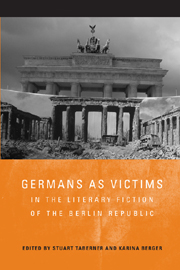Book contents
- Frontmatter
- Contents
- Acknowledgments
- Introduction
- 1 W. G. Sebald and German Wartime Suffering
- 2 The Natural History of Destruction: W. G. Sebald, Gert Ledig, and the Allied Bombings
- 3 Expulsion Novels of the 1950s: More than Meets the Eye?
- 4 “In this prison of the guard room”: Heinrich Böll's Briefe aus dem Krieg 1939–1945 in the Context of Contemporary Debates
- 5 Family, Heritage, and German Wartime Suffering in Hanns-Josef Ortheil, Stephan Wackwitz, Thomas Medicus, Dagmar Leupold, and Uwe Timm
- 6 Lost Heimat in Generational Novels by Reinhard Jirgl, Christoph Hein, and Angelika Overath
- 7 “A Different Family Story”: German Wartime Suffering in Women's Writing by Wibke Bruhns, Ute Scheub, and Christina von Braun
- 8 The Place of German Wartime Suffering in Hans-Ulrich Treichel's Family Texts
- 9 “Why only now?”: The Representation of German Wartime Suffering as a “Memory Taboo” in Günter Grass's Novella
- 10 Rereading Der Vorleser, Remembering the Perpetrator
- 11 Narrating German Suffering in the Shadow of Holocaust Victimology: W. G. Sebald, Contemporary Trauma Theory, and Dieter Forte's Air Raids Epic
- 12 Günter Grass's Account of German Wartime Suffering in Beim Häuten der Zwiebel: Mind in Mourning or Boy Adventurer?
- 13 Jackboots and Jeans: The Private and the Political in Uwe Timm's Am Beispiel meines Bruders
- 14 Memory-Work in Recent German Novels: What (if Any) Limits Remain on Empathy with the “German Experience” of the Second World War?
- 15 “Secondary Suffering” and Victimhood: The “Other” of German Identity in Bernhard Schlink's “Die Beschneidung” and Maxim Biller's “Harlem Holocaust”
- Works Cited
- Notes on the Contributors
- Index
1 - W. G. Sebald and German Wartime Suffering
Published online by Cambridge University Press: 05 February 2013
- Frontmatter
- Contents
- Acknowledgments
- Introduction
- 1 W. G. Sebald and German Wartime Suffering
- 2 The Natural History of Destruction: W. G. Sebald, Gert Ledig, and the Allied Bombings
- 3 Expulsion Novels of the 1950s: More than Meets the Eye?
- 4 “In this prison of the guard room”: Heinrich Böll's Briefe aus dem Krieg 1939–1945 in the Context of Contemporary Debates
- 5 Family, Heritage, and German Wartime Suffering in Hanns-Josef Ortheil, Stephan Wackwitz, Thomas Medicus, Dagmar Leupold, and Uwe Timm
- 6 Lost Heimat in Generational Novels by Reinhard Jirgl, Christoph Hein, and Angelika Overath
- 7 “A Different Family Story”: German Wartime Suffering in Women's Writing by Wibke Bruhns, Ute Scheub, and Christina von Braun
- 8 The Place of German Wartime Suffering in Hans-Ulrich Treichel's Family Texts
- 9 “Why only now?”: The Representation of German Wartime Suffering as a “Memory Taboo” in Günter Grass's Novella
- 10 Rereading Der Vorleser, Remembering the Perpetrator
- 11 Narrating German Suffering in the Shadow of Holocaust Victimology: W. G. Sebald, Contemporary Trauma Theory, and Dieter Forte's Air Raids Epic
- 12 Günter Grass's Account of German Wartime Suffering in Beim Häuten der Zwiebel: Mind in Mourning or Boy Adventurer?
- 13 Jackboots and Jeans: The Private and the Political in Uwe Timm's Am Beispiel meines Bruders
- 14 Memory-Work in Recent German Novels: What (if Any) Limits Remain on Empathy with the “German Experience” of the Second World War?
- 15 “Secondary Suffering” and Victimhood: The “Other” of German Identity in Bernhard Schlink's “Die Beschneidung” and Maxim Biller's “Harlem Holocaust”
- Works Cited
- Notes on the Contributors
- Index
Summary
SINCE W. G. SEBALD WAS LARGELY RESPONSIBLE for putting “German wartime suffering” back on Germany's intellectual agenda with his 1997 Zürich lectures about the air war and German literature — published in book form in Germany in 1999 under the title Luftkrieg und Literatur (Air War and Literature) — it is reasonable to inquire how he dealt with the problem of German suffering in his own literary works. After all, in Luftkrieg und Literatur Sebald argued that German writers, far from dwelling excessively on the problem of German suffering in the Second World War — and in particular on the air war that destroyed so many German cities — had actually avoided it, even treated it as a taboo subject. Seeing German writers as seismographs for the German intellectual and spiritual condition as a whole during and after the war, Sebald argued that writers' silence, reserve, and “instinctive looking away are the reasons why we know so little of what the Germans thought and observed in the five years between 1942 and 1947.” In other words, it was not just that Germans in general and German writers in particular largely avoided the problem of other people's suffering in the postwar years — the suffering of Jews, of Poles, of Russians, and so on — but that they largely avoided the problem of suffering in general, even (or especially) German suffering.
- Type
- Chapter
- Information
- Publisher: Boydell & BrewerPrint publication year: 2009

